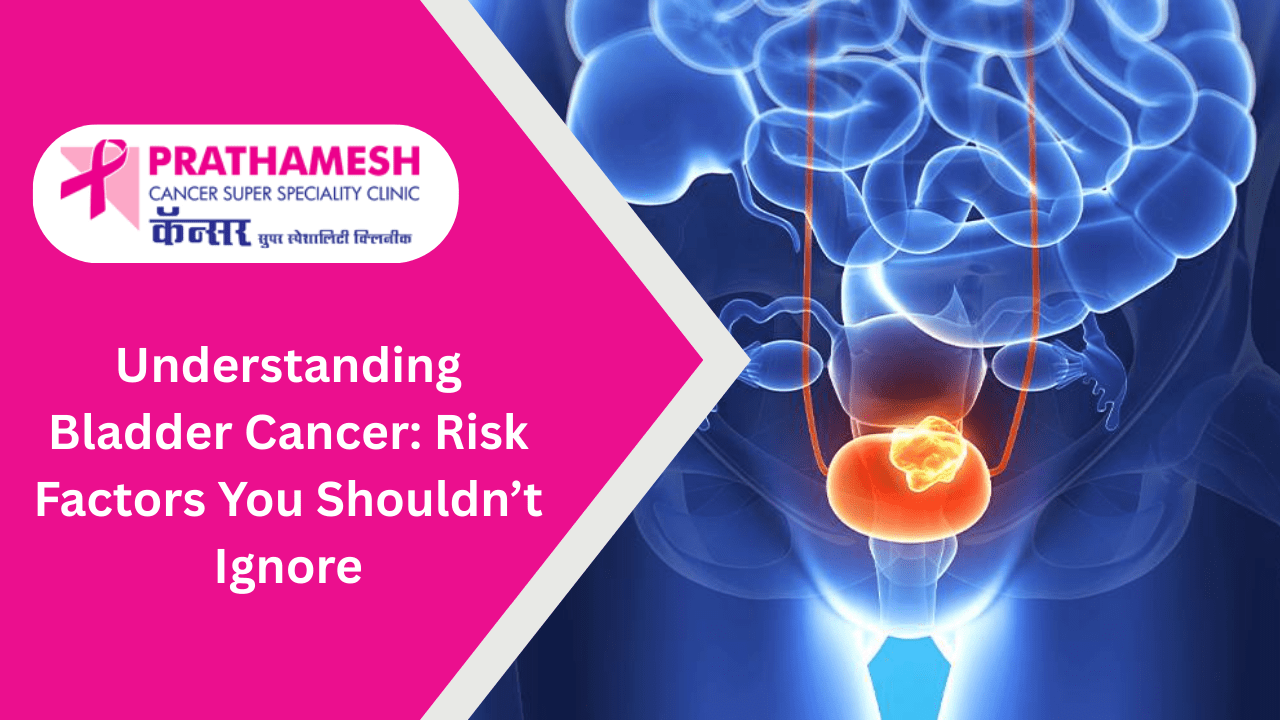Bladder cancer is one of the most common cancers affecting the urinary tract, yet it often doesn’t receive the same attention as other cancers. Early detection is key to better outcomes, but understanding risk factors is just as important for prevention.
As a cancer surgeon in Pune, I have treated many patients who were unaware of their risks until symptoms appeared. The earlier we recognize and address these factors, the better our chances of reducing the impact of bladder cancer.
This article will walk you through the basics of bladder cancer, the key risk factors you shouldn’t ignore, and why awareness can truly save lives.
What is Bladder Cancer?
The bladder is a hollow organ in the lower abdomen that stores urine before it leaves the body. Bladder cancer occurs when abnormal cells grow uncontrollably in the bladder lining or surrounding tissues.
The most common type is urothelial carcinoma, but other types include squamous cell carcinoma and adenocarcinoma. Understanding the risk factors helps in early screening and prevention.
Major Risk Factors for Bladder Cancer
- Smoking – The Leading Cause
Cigarette smoking is the single biggest risk factor for bladder cancer, responsible for nearly half of all cases. Harmful chemicals in tobacco enter the bloodstream, are filtered by the kidneys, and accumulate in the urine, damaging bladder cells over time. - Exposure to Industrial Chemicals
Workers in industries such as dye, rubber, leather, textile, and paint manufacturing are at higher risk due to prolonged exposure to certain carcinogenic chemicals (aromatic amines). - Chronic Bladder Inflammation
Long-term urinary tract infections, bladder stones, or the use of catheters can cause repeated irritation of the bladder lining, increasing cancer risk. - Age and Gender
Bladder cancer is more common in older adults, with the majority of cases diagnosed after age 55. Men are 3–4 times more likely to develop bladder cancer than women. - Family History and Genetics
Having a close relative with bladder cancer or certain genetic mutations can raise your risk. - Previous Cancer Treatment
Radiation therapy to the pelvic area or chemotherapy drugs like cyclophosphamide can increase risk years later. - Drinking Water Contaminants
Arsenic in drinking water or other harmful substances can also be a contributing factor.
Early Signs and Symptoms
While this article focuses on risk factors, recognizing symptoms is equally important. Common early signs include:
- Blood in the urine (even if painless)
- Frequent urination
- Pain or burning sensation during urination
- Lower back pain (in advanced cases)
If you notice any of these symptoms, seek medical attention immediately.
Why Understanding Risk Factors Matters
Knowing your risk allows for:
- Early Screening – Regular check-ups if you’re in a high-risk category.
- Lifestyle Changes – Quitting smoking, avoiding harmful chemical exposure, and staying hydrated.
- Prompt Medical Care – Acting quickly on symptoms to catch cancer early.
Reducing Your Risk of Bladder Cancer
- 1. Quit Smoking – This is the most effective way to lower your risk.
Use Protective Gear at Work – Especially if you work around industrial chemicals.
3. Stay Hydrated – Drinking plenty of water may help flush harmful substances from the bladder.
4. Treat Urinary Problems Promptly – Don’t ignore infections or bladder irritation.
5. Get Regular Check-Ups – Especially if you have multiple risk factors.
Case Insight from My Practice
A 60-year-old patient came to me with occasional blood in his urine, which he ignored for months, thinking it was due to a minor infection. On further evaluation, we diagnosed early-stage bladder cancer. Fortunately, because it was caught early, we were able to treat it effectively with minimally invasive surgery.
This case emphasizes why you should never ignore early warning signs especially if you fall into high-risk categories.
Preventable and Treatable with Early Detection
Bladder cancer may not be as widely discussed as some other cancers, but it is both common and preventable to some extent. Understanding and addressing the risk factors such as smoking, chemical exposure, and chronic bladder irritation—can significantly reduce your chances of developing the disease.
As Dr. Ashish Pokharkar – Cancer Surgeon in Pune, my advice is simple: stay aware, take preventive measures, and seek prompt medical advice if you experience any symptoms. Early detection truly saves lives.
Frequently Asked Questions (FAQs)
- Is bladder cancer curable?
Yes, especially when detected early. Many cases can be treated successfully, and patients can live normal lives after treatment. - Can women get bladder cancer?
Yes, although it’s more common in men, women can still develop bladder cancer, especially if exposed to risk factors. - Does drinking water help prevent bladder cancer?
Staying well-hydrated may reduce risk by flushing harmful chemicals from the bladder. - Is bladder cancer painful?
In early stages, it may not cause pain. Blood in urine is often the first noticeable sign. Pain may occur in advanced stages. - How often should high-risk individuals get screened?
Your doctor will guide you, but annual check-ups are recommended if you have multiple risk factors.





